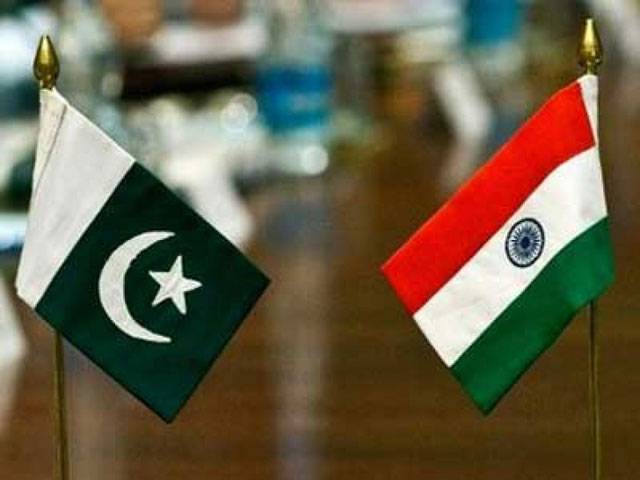ISLAMABAD - Journalists from Pakistan and India on Thursday welcomed the recent meeting between Prime Ministers Nawaz Sharif and Narendra Modi expressing the hope this could lead to revival of the bilateral dialogue.
The two Prime Ministers met in Paris on the sidelines of the UN Conference on Climate Change last Monday – breaking the ice after months of tension.
The journalists meeting at the 17th Chaophraya Dialogue from December 2-3 also welcomed reports of Indian Minister of External Affairs Sushma Swaraj’s decision to attend the forthcoming Heart of Asia ministerial meeting in Islamabad.
The Chaophraya Dialogue is a long-running Pak-India Track II engagement being jointly organised since 2008 by Jinnah Institute and Australia-India Institute.
Jinnah Institute Vice President Aziz Ahmad Khan led the Pakistani delegation, which included Hamid Mir, Mohammad Malick, Dr Moeed Pirzada, Rahimullah Yusufzai, Mariana Baabar, Mosharraf Zaidi, Cyril Almeida, Meher Bokhari, Mehr Tarar, Ali Dayan Hasan, Fahd Humayun and Arsalaan Nazir.
The Indian delegation was led by Siddharth Varadarajan, and included Sanjaya Baru, Manoj Joshi, Happymon Jacob, Sushil Aaron, Ajai Shukla, Nidhi Razdan, Zakka Jacob, Praveen Swami, Varghese George, Srinivasan Ramani, Zahiruddin Khan, Mallika Joseph and Ishan Dhar.
In a joint statement released at the end of the two-day dialogue, the participants called for the dialogue process to be delinked from confidence building measures, and recommended that cross-Line of Control interactions be encouraged and facilitated.
Furthermore, it was suggested that the elected leaders of both parts of Kashmir meet annually to explore and promote trade, people to people interaction, implement agreed-upon the Confidence Building Measures and generate good will.
The journalists from the two countries also called on the revival of the India-Pakistan backchannel, and suggested this be kept away from the frenzy of the media glare.
Over the course of the two-day deliberations, journalists and political commentators emphasised the importance of cultural exchanges, people-to-people contacts and sporting links between India and Pakistan, and urged that visa restrictions be eased to facilitate these interactions.
On the subject of Afghanistan, it was suggested that Pakistan and India consider the possibility of joint bilateral dialogue on Afghanistan to explore their common interests.
The journalists also agreed that the two countries should work towards stronger cooperation within South Asia, and focus on making SAARC a more effective platform for regional integration.
They expressed the hope that the two countries would meet soon to increase bilateral trade and economic cooperation, and urged Pakistan to give Non-Discriminatory Market Access status to India.
Senior media persons from the two countries urged the two governments to give visas to journalists from the other side to travel, as well as permission to work in each other’s countries.
To this end, they recommended that the SAARC agreement, which provided for long-term visas to journalists to visit and report from each other’s country, be implemented in letter and spirit.
They also called on Islamabad and New Delhi to implement and enhance their existing bilateral agreement allowing the posting of three journalists from the other side in their respective capitals.
Similarly, they called upon the removal of restrictions on newspapers, periodicals and all other published matter originating from the other side, and suggested that measures be taken to ease formal and informal restrictions on the broadcast of electronic media from the other side, said the statement.
On the sensitive issue of media reportage, conference delegates called on the media to ensure that diversity of opinion is reflected on all issues, thus allowing the public in both countries to make informed choices.
They called upon the media to exercise the highest professional standards at all times, and avoid speculative and inflammatory reporting on issues related to tensions between the two countries.
Thursday, November 21, 2024
Pak, India journos call for bilateral talks resumption

Punjab approves 5,000 new classrooms under school reorganization program
2:29 PM | November 21, 2024
Hezbollah chief says it reviewed US truce proposal, cease-fire in Netanyahu's hands
2:15 PM | November 21, 2024
Ishaq Dar chairs meeting on solarization of agricultural tube wells
12:51 PM | November 21, 2024
Bilawal Bhutto urges federal government to reconsider Indus canal projects
12:27 PM | November 21, 2024
Petition filed in LHC against Bilawal Bhutto and Ayaz Sadiq for election act violation
12:06 PM | November 21, 2024
-
Hunger crisis to increase in South Sudan, warns UN
-
Hunger crisis to increase in South Sudan, warns UN
-
Pakistan’s judiciary champions climate justice at COP29 in Baku
-
Punjab struggles with persistent smog as Met Office forecast rainfall
-
Punjab residents face escalating smog crisis as pollution levels soar across country
-
Qatar says Hamas 'no longer welcome' in Gulf state
Land of Vigilantes
November 21, 2024
United in Genocide
November 21, 2024
Finally Fighting Back
November 21, 2024
Digital Stagnation
November 20, 2024
Xi’s Red Lines
November 20, 2024
Independent Supreme Court
November 21, 2024
Fat Loss Fantasy
November 21, 2024
Tackle Corruption Within School Boards
November 20, 2024
To Be Opportunistic
November 20, 2024
Democratic Backsliding
November 20, 2024
ePaper - Nawaiwaqt
Nawaiwaqt Group | Copyright © 2024





